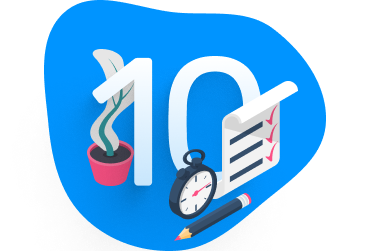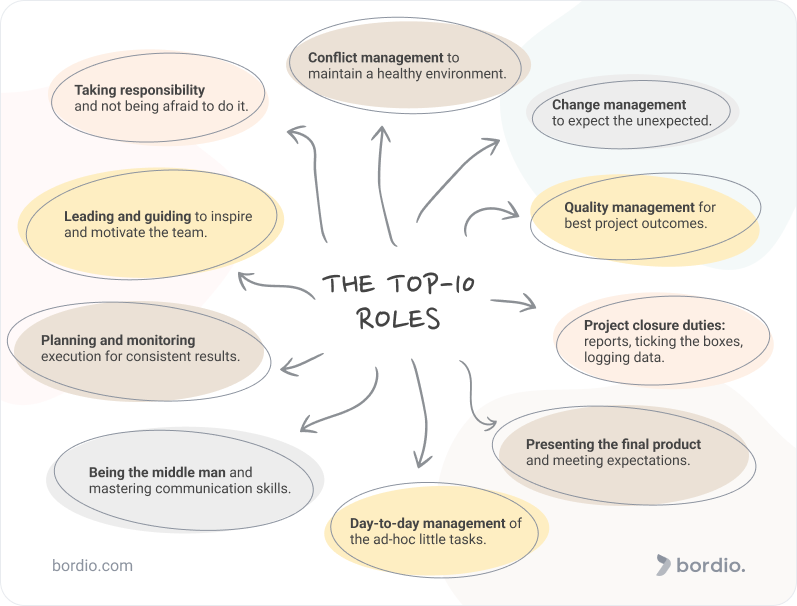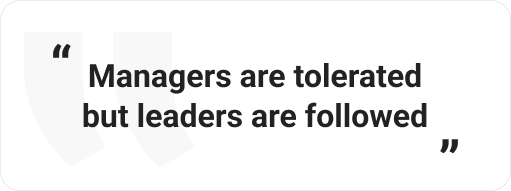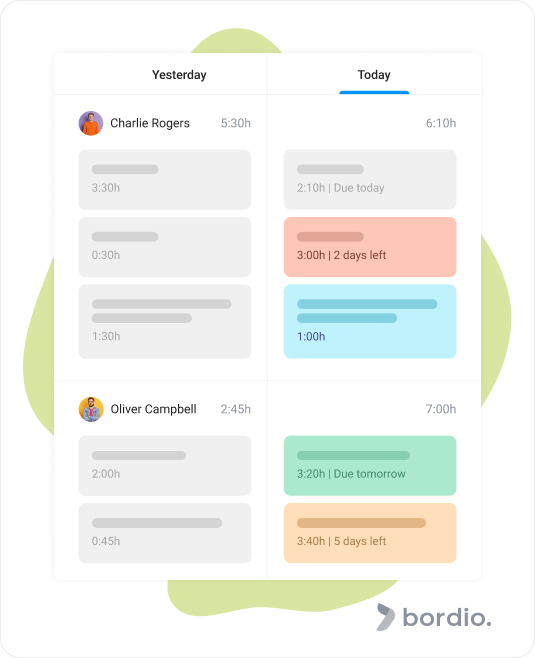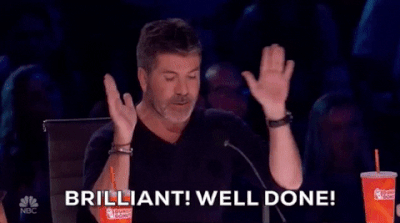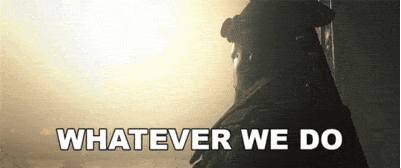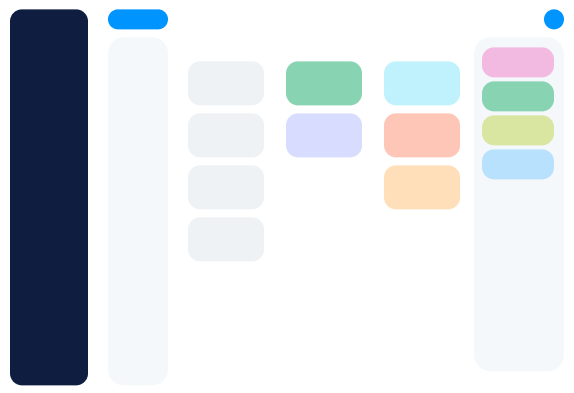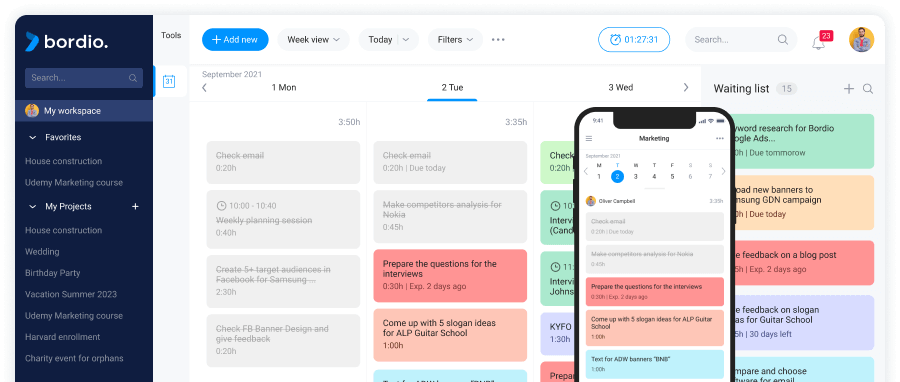Being a project manager (PM) means different things for different companies and industries. There is no single standard, and the position is subject to interpretation.
First and foremost, a PM is a leader of the cross-functional project team. It’s someone who guides the project, who follows it through the team tracking software and motivates everyone to execute well. Sometimes a project manager brings the team together, including hiring and onboarding processes. Other times PMs are assigned to an existing team.
The second biggest role of the project manager is helping deliver high-quality results within the planned timeframe and budget. He also introduces innovations such as the use of best tools for time management and collaboration with saas marketing companies. It is really a talent and an important project management skill to stay within the frames negotiated at the beginning.
In today’s article, we will dive deep into various roles and responsibilities that project managers have. So, if you are looking for a detailed insight into what it means to be and takes to become a project manager, continue reading!
The roles and responsibilities of project managers
Here we’ve included a rather extensive list of duties that PMs across the globe are assigned with.
Not all project managers have them as a part of their jobs because it depends on the employer as well as project managers’ experience or market they work on.
In any case, the list below shows a rather accurate picture of potential tasks and responsibilities that would be expected of PMs.
#1 Taking responsibility
Taking responsibility is, perhaps, the main task of any manager, and it is no different in project management.
Good project managers know how to take responsibility and are not afraid to do it. With a manager like that, team members feel secure and confident, project stakeholders have a trusted partner, and the overall project success rate goes up.
Nothing is quite as frustrating as a project manager who is unable to make a decision and stand by it. While team members are equally responsible for the project’s progress, everyone works under a project manager who is ultimately responsible for the outcome. And one great way to jeopardize the project’s success is for a PM to play the blaming game or not make up his mind quickly enough.
#2 Leadership and guidance
The next project manager role is being a leader and a mentor. Best project managers will not only check that the work is done and approve the next steps but also guide and help team members. This may come in different shapes and forms: through little confidence talks, sharing the vision on meetings, working on improving team productivity, for example, by introducing new tools for project management, educating where the team is lacking expertise, allowing the team to experiment and make their own decisions. This often requires using a combination of multiple management styles along with leadership practices.
Some might say that leadership is overrated, but it does play a vital role in the project progress:
- Motivates the team
- Fosters collaboration
- Ensures healthy productivity
- Prevents burnout
- Reduces project risks
Managers are tolerated, but leaders are followed. If and when the project experiences hardship or some of the team members lose motivation, it’s a leader status that will bring everything back to life. The project manager must inspire and motivate team members and set an example for everyone else. It’s not easy, but it has to be done if you want to achieve project objectives, and become good in team’s time managing.
#3 Planning and overlooking the execution
Project management is somewhat romanticized these days.
When we think of it, we like to imagine a group of inspired and talented individuals working together on one big idea in the room with lots of sticker notes, drawn graphs, a bunch of powerful computers, and coffee cups spread around. And then, at one moment, all of them come together lovingly looking at a screen where the perfectly functioning software is presented, followed by hugs and high fives.
Now, it is possible to see something like that in real life too. But a lot of the project management consists of documenting, negotiating, logging, and monitoring. Project planning is not that glamorous, but it has to be done. And guess who is doing that? That’s right, a project manager.
PMs might have assistants to take care of some part of the workload. But for the most part, it’s the project manager doing things like:
- Creating a detailed project plan that includes costs, project schedule, milestones, and project scope.
- Outlining dependencies between the tasks and stages, as well as task priorities.
- Foreseeing all major project risks/changes/difficulties/successes and including them in the plan.
- Making sure the plan is actually followed with tools like calendar planners and weekly planners.
Some of the questions that project managers ask themselves:
- Which project activities have the highest priority and have to be finished first?
- How much time does each task take?
- How many resources (for example, labor hours and equipment) does each task require?
- Do I have every specialist I need on my team? If not, who is missing, and where can I find them?
- What would be the total cost of the project?
- Have I considered every project risk? What are the potential future risks, and how can I avert them?
- How many milestones does the project need, and what should they be?
#4 Being the middle man
A project manager is a key contact between project stakeholders and the project team.
They come up with a project communication plan to ensure that communication is efficient, positive and professional. On top of that, they need to keep key stakeholders happy, deal with their objections and suggestions. To do that, PMs communicate the project’s life cycle, policies, and processes in great detail, often multiple times to help everyone get on the same page.
It’s not that easy to manage client’s expectations. Project stakeholder management is an art form in itself. And with some clients being extra diligent, it takes an experienced project manager to be able to address and meet all of those expectations without spending the entire day on it.
So, a successful project manager needs to have good communication skills. That includes both listening and speaking.
#5 Daily-to-day management
Let’s not forget about daily ad-hoc tasks associated with the project. From helping the team member out, jumping on a last-minute call with a supplier, to covering for someone who’s sick, a project manager is the one to do it all.
Daily project manager responsibilities also include monitoring how the team is doing. That is not hard with tools such as online daily schedule planner. It has to be done in a subtle way not to suffocate anyone with micromanagement, but it needs to be quick and efficient at the same time.
Project management software can be a great help in optimizing and automating this aspect of the project manager job. Bordio, for example, allows PMs to view their team’s schedules even if some of the project members are assigned to a different manager in the company. Tools such as simple task trackers or schedule builders are helpful for team’s work and managing.
With the daily planner online, PMs can see their workload in the project and the organization as a whole. It helps get an insight into why some employees take more time to finish a task. And it is a great tool when choosing whom to assign the new job. The project manager can check the calendar online planner, see who’s got the availability, and not overload those who are already too busy.
#6 Conflict management
Conflicts and disagreements are almost unavoidable when it comes to teamwork. And in time-scarce high-pressure environments of project execution, the chances of having an argument quadruple.
When conflicts happen, project managers play a role of a mitigator and the judge. Whether personal or project-related, conflicts distract the team members from work and create unnecessary obstacles to successful project completion.
Organizing team building activities and regular meetings is one of the preventative measures that experienced project managers actively use to minimize possible misunderstandings that might grow into something bigger.
By the way, if you made a mistake and need to make amends, we have a detailed guide on apologizing to your boss to help you resolve the issue professionally.
#7 Change management
Hardly any project goes with zero changes, and it takes a certain talent to keep the project together if things do not go according to plan made in time planner.
A project manager gets to review change requests and either approve or decline those suggestions. But it’s not as easy as it sounds. The decision that a PM makes can make or break the project outcome. It means that a project manager has to consider it from a risk management perspective, and calculate the long-term effects of their (un)willingness to approve the change.
Simultaneously, a project manager needs to keep in mind the financial and emotional aftermath of their decision. You can’t please everyone but getting as close to it as possible is a big part of the PM’s job.
#8 Quality management
It is not enough to have project deliverables ready at the end of the project. They also have to be of a certain quality, not have any bugs or issues (or at least not too many!), and be convenient for users to work with.
All that is achieved through periodic performance reviews and monitoring of overall project team performance. A project manager has to be a good leader and be technologically and design-savvy. They don’t have to possess the same knowledge as their key team members, but they have to be able to identify potential threats and issues. In the end, using an outside perspective and electronic planners will greatly help to reduce the number of errors in your work.
Ideally, some of the project team members should assist a PM with that and point their attention towards it, but it’s not always the case in reality.
#9 Final product presentation
As the project life cycle is coming to an end, the time for the final product presentation of deliverables arrives.
We talked about many important project manager responsibilities already. But among many project manager duties, presenting project deliverables is probably the most nerve-wracking and stressful one. That’s when the entire project performance and progress is reviewed, and the results of the work are compared against the initial project scope.
So, the two main goals that any project manager has at this point are:
- Meeting client and stakeholder expectations.
- Having the final product approved and accepted.
If the project is considered a success, a project manager is more likely to be hired for future projects.
#10 Project closure
Everyone knows that project managers guide, support, and, well, manage projects from start to finish. Not everyone, however, thinks about what happens after the project is finished. A bottle of champagne is popped, a celebratory meeting is organized, but what then?
Someone has to clean up once the party is over, and that someone, often, is the project manager. They are responsible for a lot of mundane tasks in closing projects, such as:
- Ensuring all obligations are met.
- Checking that all tasks in the to-do list app are completed and doing the final touches where needed.
- Any necessary data has to be logged in the system and shared.
- Comprehensive reports and project documents are written, the company’s knowledge base is updated.
The list goes on. And even if the project manager has those tasks delegated to the project team, they still have to review and approve the final work, which takes a lot of time and energy.
A little bit of everything
The role of the PM changes and transforms together with the project. One week project managers might be proving themselves as leaders. The next week they will be the change manager or play an administrative role.
A good project manager must be entrepreneurial in order to come up with a creative solution, keep a thousand things on their mind at once, overlook everything without missing important details, and have the vision to create something from scratch.
It is an exciting position as project managers are always on the go, get to work with new services and products, meet different teams, learn new skills and gather unique knowledge.
However, it is a tough job with loads of responsibilities that require resilience, self-discipline, and drive. If you are considering becoming a project manager and are interested in upgrading your productivity and leadership skills, check out our article with the list of best productivity books.
Final thoughts on project manager roles and responsibilities
According to a report by KPMG, only 25% of all projects are delivered successfully, and only 51% of projects are likely to meet the original goal and business intent.
While there are many reasons for project progress to slow down and the initial plan to derail, one of the big reasons is failing to find the right project manager for the job. An experienced and successful project manager can balance the challenges and ever-changing environment to deliver outstanding results and bring the idea to life.
The right technology will do the rest. Take a look at Bordio – a project management software designed for efficient teamwork. It combines project management tools, personal productivity and smart time management features, and it’s designed for teams of all sizes. Sign up today and see for yourself how it can up-level your project management game.
